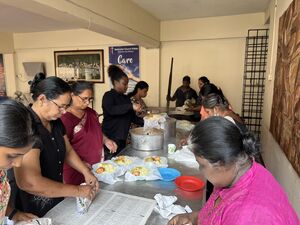"United Action" - under this name fundraising campaigns are launched in Africa and Asia. The donations are used to support projects and programmes in the member churches of the UEM.
United Action is more than just a fundraising campaign. United Action symbolizes the common aspiration of all UEM members churches in all three regions, Africa, Asia and Germany, to work together to improve people’s living conditions. In South Africa the term Ubuntu is commonly used while in Indonesia they use the term Gotong Royong. These expressions perfectly embody the spirit of United Action. A togetherness regardless of the little or much that one has. The great willingness to donate and the solidarity of the African and Asian members after the flood disaster in the Ahr valley has attracted lasting attention, both within and outside the UEM community. With "United Action", every member of the UEM stands by the side of the people who need support.
United Action Coordinators are local persons who have taken on the responsibility of driving all United Action activities and getting grassroots persons involved by making small or big monetary contributions to their own development.
In UEM everyone is equal and no one person, institution or church has the responsibility to rescue another. In fact, with United Action member churches in Asia and Africa recognize that they have a responsibility to be in the driver seat of their own social development which is why they work hard to raise funds to contribute to United Action which ultimately supports contextual projects which they initiate and implement themselves.
It is widely reported that Sri Lanka currently faces and economic crisis and that a consequence of this, according to the United Nations, is that ‘’ 6.3 million people have been rendered food insecure, meaning that they cannot access a nutritious diet on a daily basis.’’ The World Food program reports that ‘the economic crisis will push families into hunger and poverty – some for the first time – adding to thehalf a million people who the World Bank estimates have fallen below the poverty line because of the pandemic.’’
At face value one would think that everything is fine said the President of Methodist church in Sri Lanka. He continued to say that it is really the poor who feel the economic crisis. The people in the rural areas now have to reduce how often they eat or reduce their portion sizes to maintain eating three times a day. Since the prices of food has sky rocketed, the Sri Lankans resort to eating foods that have very little nutritional value. Children go to school on empty stomachs and adults are making loans or leaning into other financial assistance programs to cover their most basic everyday needs which puts further financial pressure on those who really cannot afford it.

To support those who are most vulnerable to food insecurity, the Methodist church in Sri Lanka has initiated a project which is supported by UEM called the Good Samaritan Project. The Good Samaritan project ensures that those who are really in need get a nutritious meal at least twice a week. Furthermore it comes alongside people who might feel overwhelmed by their circumstances by providing personalized counselling and prayer. To help address the long term problem, the Good Samaritan project also educates and encourages Sri Lankans to grow their food and to reduce the purchases of imported goods and instead to purchase proudly Sri Lankan products.
Terri-Lynn Smith, our programme officer for United Action in Asia, visited Nias Island and was overwhelmed by their action:
Last week I visited Nias Island, where amongst other responsibilities I met a group of women from a village in North Nias who produce pig feed. Why was this interesting to me? Or why did it inspire me so much? Honestly, it is because these woman saw a problem in their village and set out to solve it with the support of UEM and in small ways they have affected the economy of their village. When I spoke to them, one of the woman said ‘’instead of going around from house to house gossiping because the pandemic had limited us so much in terms of work, we decided to help our community’’.
What one needs to understand is that the population of Nias are mostly farmers and fishermen. This is how they support themselves. With the pandemic they had no place to sell their produce or purchase feed for their animals. At the same time, a big part of Nias culture is raising pigs. With any Nias cultural activity the presence of pork is expected. Sadly, the island of Nias was affected by African Swine Flu which meant that most pigs of their pigs had died which further meant a loss of income and in many ways affected them culturally, too. Anyone would agree that the circumstances were dire for the people of Nias as well as these woman who also raise pigs themselves.
UEM had supported a small group of woman with training to produce high quality pig feed as well as the purchasing of a very basic manual machine to produce it. I asked them about the ingredients to produce their stock. They explained to me that their husbands and men in their village are the suppliers of the fish which is the main ingredient in their production.
Later, I spoke to one of the customers of their feed. The customer who is also a woman said to me that their pig feed is more affordable and the quality is better but that it is cheaper than what is on offer at the traditional market. She went on to tell me and show me that her pig is healthier and fatter. Following the meeting with this customer I met another farmer whose pig had just given birth to 6 healthy piglets. He said that he also used the pig feed and when the piglets are of age, they would also consume the locally produced pig feed.
These 5 woman created an informal job opportunity for their husbands, and they supply their entire village with the feed which produces healthy pigs. This goes on to sustain their villages livelihood while at the same time bringing back dignity to their cultural meetings. I celebrate this women because they saw a problem and solved by applying themselves, while still having to be mothers and wives which we know has not been the easiest during the pandemic.
They explained to me that it is their desire to supply their surrounding villages, but until now they are not able to meet the demand due to the limitations of the machine they use for production. They are currently looking for possibilities to purchase a more efficient machine.
This same project has been duplicated on Tello Island, a regency of Nias Island.

UEM Asia: Bank BNI - account# 0128002447 - Swift code: BNINIDJAMDN
UEM Africa: CRDB BANK PLC - branch: 3319 - account# 1950299692300 - Swift code: CORUTZTZ
IBAN: DE45 3506 0190 0009 0909 08
SWIFT/BIC: GENODED1DKD
![]() spenden@vemission.org
spenden@vemission.org
![]() 0202-89004-195
0202-89004-195
![]() info@vemission.org
info@vemission.org
![]() 0202-89004-0
0202-89004-0
![]() presse@vemission.org
presse@vemission.org
![]() 0202-89004-135
0202-89004-135